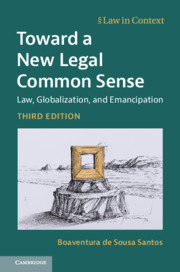Book contents
- Toward a New Legal Common Sense
- The Law in Context Series
- Toward a New Legal Common Sense
- Copyright page
- Dedication
- Contents
- Preface to the Third Edition
- Preface to the Second Edition
- Acknowledgements
- 1 The Tension between Regulation and Emancipation in Western Modernity and Its Demise
- 2 Toward an Oppositional Postmodern Understanding of Law
- 3 Legal Plurality and the Time-Spaces of Law: The Local, the National, and the Global
- 4 The Law of the Oppressed: The Construction and Reproduction of Legality in Pasargada
- 5 Globalization, Nation-States, and the Legal Field: From Legal Diaspora to Legal Ecumenism?
- 6 Law and Democracy: The Global Reform of Courts
- 7 On Modes of Production of Social Law and Social Power
- 8 Law: A Map of Misreading
- 9 Can Law Be Emancipatory?
- Postface as Disquietude
- Bibliography
- Index of Names
- Index of Subjects
6 - Law and Democracy: The Global Reform of Courts
Published online by Cambridge University Press: 08 October 2020
- Toward a New Legal Common Sense
- The Law in Context Series
- Toward a New Legal Common Sense
- Copyright page
- Dedication
- Contents
- Preface to the Third Edition
- Preface to the Second Edition
- Acknowledgements
- 1 The Tension between Regulation and Emancipation in Western Modernity and Its Demise
- 2 Toward an Oppositional Postmodern Understanding of Law
- 3 Legal Plurality and the Time-Spaces of Law: The Local, the National, and the Global
- 4 The Law of the Oppressed: The Construction and Reproduction of Legality in Pasargada
- 5 Globalization, Nation-States, and the Legal Field: From Legal Diaspora to Legal Ecumenism?
- 6 Law and Democracy: The Global Reform of Courts
- 7 On Modes of Production of Social Law and Social Power
- 8 Law: A Map of Misreading
- 9 Can Law Be Emancipatory?
- Postface as Disquietude
- Bibliography
- Index of Names
- Index of Subjects
Summary
In Chapter Six the tension between the global and the national scale of law is further studied through an analysis of the court reforms that are occurring a little everywhere. I inquire into the recent protagonism of courts in handling political conflicts and restructuring economies according to the Washington Consensus (the judicialization of politics), and analyze the impact this transformation has had on the judicial system itself (the politicization of courts). The globalization of the reform of the judicial system is thus understood as a form of globalization of law, particular attention being given to the contribution that the reformed courts may bring to democracy.First, I consider the global political, economic and ideological context in which the consensus of the rule of law and judicial reform and activism has developed. Second, I examine whether the role played by courts in the modern state is linked to the transformations undergone by the state itself. Third, I assess the prospects for democracy deriving from the worldwide focus on the rule of law and court reform.
Keywords
- Type
- Chapter
- Information
- Toward a New Legal Common SenseLaw, Globalization, and Emancipation, pp. 370 - 419Publisher: Cambridge University PressPrint publication year: 2020

